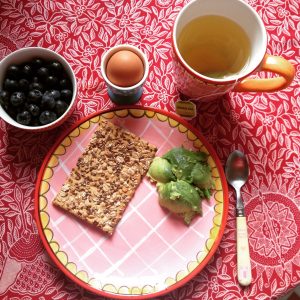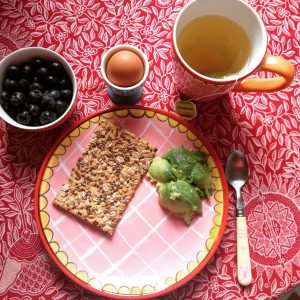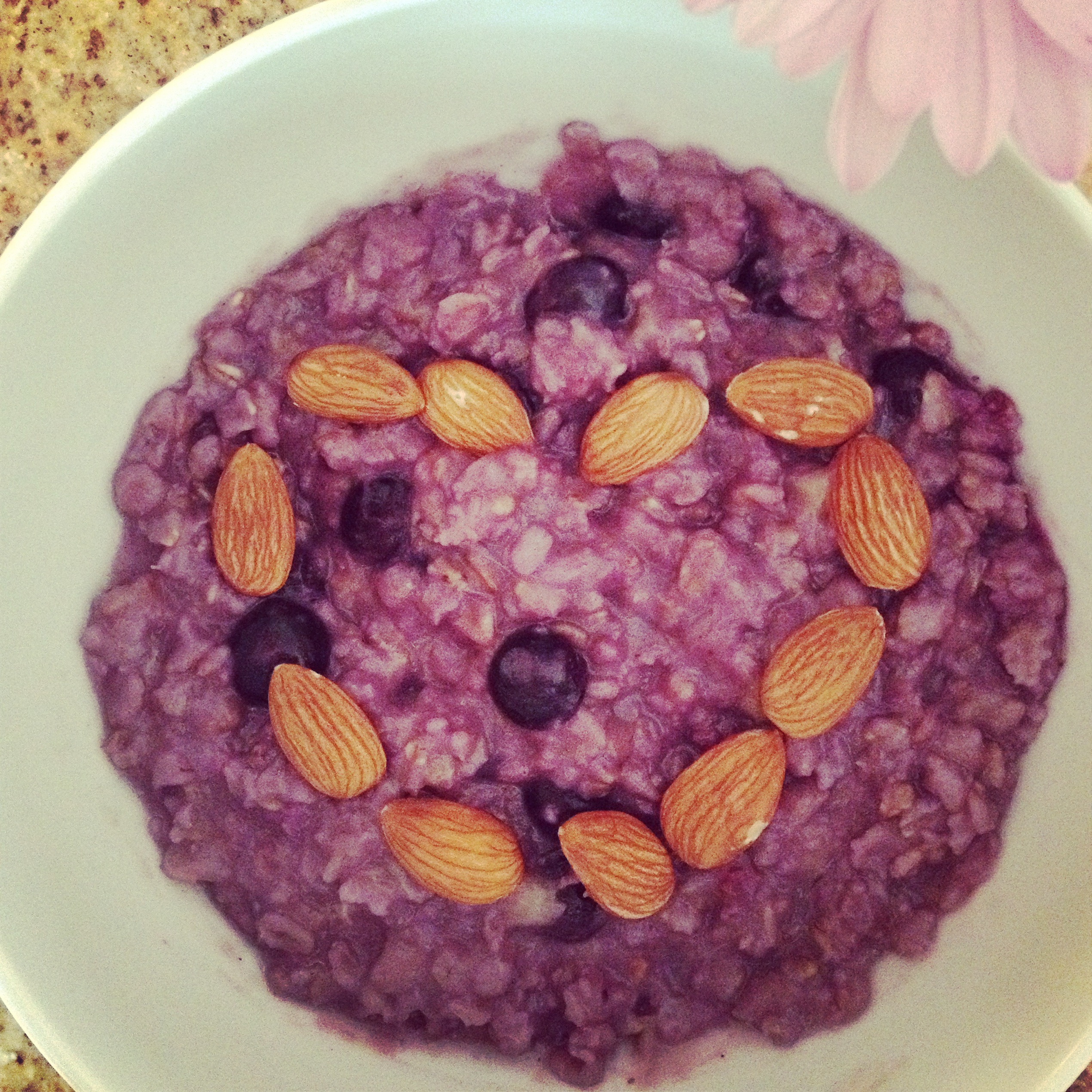
18 Apr Detox your Life
When hearing the word “detox” I used to think of endurance and anguish. Back in the 80’s my dad would do a detox by just drinking warm water with lemon juice and maple syrup for 3 days. It sounded horrible. I have also seen juice cleanses advertised as “energizing and super healthy for your system”. This may be true for some people, but for me – having a high dose of Vata in my system – just drinking liquids for a meal doesn’t work. It will only leave me with an upset digestive system. (More about that in a future blog.) Nonetheless I recently joined a 5-day detox yoga retreat. Even though I eat very healthy, I was still curious what a detox would do for me. And since this program allowed me to experiment in a group under the guidance of an experienced teacher, rather than trying a do-it-yourself cleanse at home, I thought I’d give it a go. I’m glad I did, as this retreat has given me a completely new perspective on the concept of detoxing.
The word detox comes from the word “detoxification”, which means: to eliminate toxins. Even if we eat only organic food, our body will still have to deal with toxins that have an adverse effect on our health. There are not only internal toxins, but also external toxins such as air pollution and skin products, that put stress on our organs having to eliminate these from our system. By changing what we eat, we can help our body to digest and eliminate more easily and effectively. This will result in increased energy levels, better concentration and focus, reduced allergic symptoms, and even weight loss.
On the first night of my detox retreat I was happy to find out that we wouldn’t be drinking juice for 5 days. Instead, it was suggested we either eliminate, or at least strongly reduce, the intake of:
- Coffee and caffeine
- Sugar and artificial sweeteners
- Wheat
- Dairy
- Alcohol
These five substances are the main triggers for allergies and – depending in which quantities we use them – have a negative impact on our health. Not having “the big 5” takes a big load of our digestive system, even if it’s only for 5 days. Here is a quick overview to get a better idea what “the big 5” do to our body (This is obviously not a complete list. I highly recommend Tiffany Cruikshank’s book Optimal Health for a Vibrant Life. Cameron Diaz’s The Body Book is a good resource as well.):
Ad 1. Caffeine affects our blood sugar level; tricking the body into thinking it doesn’t need to eat. We may not feel hungry with a lot of caffeine in our system. Drinking too much caffeine also prevents us from resting when we need it. Why not take a 15-minute nap instead of drinking another cup of coffee? (I know, this is not always possible, but creating awareness is the first step.) More importantly, caffeine clogs up the liver and so prevents it from processing other toxins.
Ad 2. I have written another blog about why sugar is so bad for you (and it’s not just bad for your teeth and your weight!). You can read it here.
Ad 3. Wheat in itself is not necessarily unhealthy when you eat it in moderation. It is the component gluten that is an irritant for a lot of people. Gluten is a protein composite found in wheat and related grains, including barley and rye. It makes dough elastic and helps it rise and keep its shape. It also gives the final product a chewy texture. The protein in the wheat plant (which is the gluten) acts as the plants natural defense and immune system. The problem with most wheat that is produced is, although it is not genetically modified (yet), it has been significantly altered by selection, through generations of hybrid alterations to increase yields and make it more disease resistant. In other words: the gluten protein of the plant has become so strong that when we eat it, it creates an allergic reaction in our body. The undigested gluten proteins stay in the intestines and are treated by our body like a foreign invader. They irritate the gut and flatten the microvilli along the small intestine wall. Without those microvilli, there is considerably less surface area with which to absorb the nutrients from our food. This leads sufferers to experience symptoms of malabsorption, including chronic fatigue, neurological disorders, nutrient deficiencies, anemia, nausea, skin rashes, depression, and more.
Some people feel fine eating wheat when it is from organic origin (it is less altered), or can eat other grains containing gluten such as spelt and oatmeal. The only way to determine if you are allergic or sensitive to gluten is to eliminate it completely from your diet (this includes “hidden” gluten in soy sauces, salad dressings etc., so read the labels of everything you eat!). After a month or two you can carefully reintroduce some gluten and see if that changes the way you feel.
Ad 4. Dairy produces mucus in the body when eaten in excess, creating a sluggish digestion and fatigue. True milk allergy has more severe symptoms like vomiting, wheezing and hives. Lactose intolerance can show up as diarrhea, bloating and abdominal cramps, amongst others. An elimination diet, as described above, is the best way to find out how dairy affects you.
Ad 5. Some researchers suggest that having one glass of wine per day is actually good for your heart, while others debunk that. Fact is that alcohol strips the body from magnesium, a mineral that activates over 300 enzyme reactions in the body, translating to thousands of biochemical reactions happening on a constant basis daily. Magnesium is crucial to nerve transmission, muscle contraction, blood coagulation, energy production, nutrient metabolism and bone and cell formation. Moderation is key. Now and then we need to give our liver a break from having to deal with heavy toxins like alcohol and caffeine. If you are not ready to give up alcohol completely, make sure that at least you refrain from drinking for a day or two on a regular basis.
 I decided to go hard-core and eliminate most of the big 5 from my diet. As we were at the Kripalu Center for Yoga & Health not having a glass of wine at night was easy: there is simply no alcohol allowed on campus. As for the other 4, I didn’t anticipate that much struggle. For a whole year I ate gluten-free (which made me feel better initially, but also caused a lot of stress; I travel a lot and maintaining a gluten-free diet on the international road is not that easy…). And I already eat very little sugar and dairy. The only thing I was curious about was what the effect would be of not having coffee. I do not consider myself a coffee addict by any means (I drink one cup per day, sometimes none at all), but I had just been on a road trip with my husband and we had drunk a lot more coffee than usual. Back in my room after the introduction session – equipped with a supply of protein powder and greens powder to have for breakfast (so yes, there was a little bit of a “drinking liquids as a meal factor”) – I wrote in my diary: “My intention for this detox is to limit caffeine to 1 cup of green tea per day, no sugar, no gluten, limit dairy. I also set the intention to have no alcohol for the whole month of April.”
I decided to go hard-core and eliminate most of the big 5 from my diet. As we were at the Kripalu Center for Yoga & Health not having a glass of wine at night was easy: there is simply no alcohol allowed on campus. As for the other 4, I didn’t anticipate that much struggle. For a whole year I ate gluten-free (which made me feel better initially, but also caused a lot of stress; I travel a lot and maintaining a gluten-free diet on the international road is not that easy…). And I already eat very little sugar and dairy. The only thing I was curious about was what the effect would be of not having coffee. I do not consider myself a coffee addict by any means (I drink one cup per day, sometimes none at all), but I had just been on a road trip with my husband and we had drunk a lot more coffee than usual. Back in my room after the introduction session – equipped with a supply of protein powder and greens powder to have for breakfast (so yes, there was a little bit of a “drinking liquids as a meal factor”) – I wrote in my diary: “My intention for this detox is to limit caffeine to 1 cup of green tea per day, no sugar, no gluten, limit dairy. I also set the intention to have no alcohol for the whole month of April.”
So what did I eat? I ate a lot of vegetables (50-60% of each meal) and some fruit. Fruit has a naturally high sugar content, so just eating fruit is not the healthiest choice. I had whole grains like quinoa and brown rice (10-20% of each meal) and protein such as eggs, turkey, fish and tempeh (30-40% of each meal). And I would add fat to every meal. Yes, you read that right: fat.
For the longest time, fat has been regarded as bad for you. However, the creation of fat-free foods has created many more problems, as I have addressed in my blog about sugar. And here is the thing: fats are actually a necessary component of your diet as they are responsible for many vital functions in your body. Did you know that 60% of the brain is composed of fat? Or that 60% of our heart’s energy comes from fat? Fats are also an important component of our nerves, lungs, eyes and digestion, and are required to make hormones. The fats you eat in a meal slow down the digestive process so the body has more time to absorb nutrients. Fats make your hair shiny and your skin soft. Therefore, eat fats and your body will be happy!
A side note on fats (without going into detail. I refer to Cruikshanks’s book): there are “good” and “bad” fats. Use (organic) coconut oil or (clarified) butter for baking, and (organic) extra-virgin olive oil to sprinkle over your food. Eat almonds, macadamia nuts, avocados and fatty fish. Avoid trans fats at all cost. Trans fats are chemically produced and mimic natural fats in some respects. They are unnatural to the human body and are not essential. They elevate the risk of coronary heart disease, but are also linked to other serious diseases like cancer, liver dysfunction and obesity. In the US food manufacturers are required to list trans fats on nutrition labels. Be aware that when a label says “0 trans fats” this not always means there are no trans fast at all. The requirement of listing trans fast only applies when the amount is more than 0.5 grams. No amount of trans fat is healthy, and 2 grams is the maximum allowed amount in Europe. If the ingredients contain partially hydrogenated oil, the product is suspect. Therefore avoid margarines and vegetable shortening.
During the detox retreat I had a protein powder shake for breakfast and as an afternoon snack. I always associated protein powders with body-builders, and now I know why that should not be a negative association: proteins are building blocks and they repair the body. There are 10 essential amino acids (of the 20 that make up all animal protein); our body cannot make them so we need to supply them through our diet. Meat and fish are the easiest way to get all the amino acids we need. Vegetarian options are: eggs (but eat the organic ones), Greek yoghurt (contains more protein than regular yoghurt), beans and soy (preferably unfermented like tempeh and miso). I eat mostly vegetarian and prefer to not eat soy, so I have found it challenging to eat enough protein. By taking the protein powder twice a day during the retreat I felt more energized than I had in a long time. Who would have thought that my detox revelation would come from that!
In addition to creating a renewed awareness of physical nutrition while in the retreat, I nourished my body and mind with 5 hours of yoga, journaling, reading, walking in nature and a one-day “media detox” during which I kept my phone turned off. Needless to say I felt rejuvenated at the end of that week. Oh, and by the way: I didn’t miss my coffee at all, and after the first 2 days I even stopped drinking green tea.
Back at home I continue to be aware of what it is I put in my mouth, and what toxins I can eliminate. I am not on a diet; I just have a healthy life-style that includes the way I eat. I want to treat my body with respect and give it what it needs. Yes, I eat pizza for dinner sometimes (not frozen, but from our local pizzeria), but I balance that out by having a kale salad for lunch. I continue to take protein powder. Since those powders have various sources of protein, I am currently experimenting with different types to see which suits me best. Most protein powders are based on whey, rice, or pea protein. Be aware that there are big differences in quality, and that some powders have a lot of additional ingredients. Don’t settle for cheap in this case! I ask myself: “Is this nourishing me?” Not only when it comes to food, but also relating to other aspects of my life, such as the activities I undertake, the friendships I maintain and the books I read. Letting go of people, things and habits can be a detox in itself. What can you do to detox your life?
